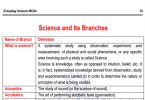Science and its Branches
PDF Link is available at the bottom of this post
| Name of Branch | Definition |
| What is science? | A systematic study using observation, experiment, and measurement, of physical and social phenomena, or any specific area involving such a study is called Science
Science is knowledge, often as opposed to intuition, belief, etc. It is, in fact, systematized knowledge derived from observation, study and experimentation carried on in order to determine the nature or principles of what is being studied. Science and its Branches |
| Acoustics | The study of sound (or the science of sound). |
| Acrobatics | The art of performing acrobatic feats (gymnastics). |
| Aerodynamics | (i) The branch of mechanics that deals with the motion of air and other gases. (ii) The study of the motion and control of solid bodies like aircraft, missiles, etc., in air Science and its Branches |
| Aeronautics | The Science or art of flight. Science and its Branches |
| Aerostatics | The branch of statics that deals with gases in equilibrium and with gases and bodies in them. |
| Aesthetics | The philosophy of fine arts. |
| Aetiology | The science of causation. |
| Agrobiology | The science of plant life and plant nutrition. Science and its Branches |
| Agronomics | The science of managing land or crops. Science and its Branches |
| Agronomy | The science of soil management and the production of field crops. Science and its Branches |
| Agrostology | The study of grasses. |
| Alchemy | Chemistry in ancient times. |
| Anatomy | The science dealing with the structure of animals, plants or human body. Science and its Branches |
| Anthropology | The science that deals with the origins, physical and cultural development of mankind. Science and its Branches |
| Arboriculture | Cultivation of trees and vegetables. |
| Archaeology | The study of antiquities. |
| Astrology | The ancient art of predicting the course of human destinies with the help of indications deduced from the position and movement of the heavenly bodies. |
| Astronautics | The science of space travel. |
| Astronomy | – The study of the heavenly bodies. Science and its Branches |
| Astrophysics | The branch of astronomy concerned with the physical nature of heavenly bodies. |
| Bacteriology | The study of bacteria. |
| Biochemistry | The study of chemical processes of living things. |
| Biology | The study of living things. |
| Biometry | The application of mathematics to the study of living things. Science and its Branches |
| Bionics | The study of functions, characteristics and phenomena observed in the living world and the application of this knowledge to the world of machines. |
| Bionomics | The study of the relation of an organism to its environments. |
| Bionomy | The science of the laws of life. |
| Biophysics | The physics of vital processes (living things). |
| Botany | The study of plants. |
| Calisthenics | The systematic exercises for attaining strength and gracefulness. |
| Cartography | Science of Map Making. |
| Ceramics | The art and technology of making objects from clay, etc. (Pottery). |
| Chemical engineering | the application of science, mathematics, and economics to the process of converting raw materials or chemicals into more useful or valuable forms |
| Chemistry | The study of elementary and their laws of combination and behaviour. |
| Chemotherapy | The treatment of disease by using chemical substances. |
| Chronobiology | The study of the duration of life. |
| Chronology | The science of arranging time in periods and ascertaining the dates and historical order of past events. |
| Climatology | the study of climates and investigations of its phenomena and causes |
| Computer science | the systematic study of computing systems and computation |
| Conchology | The branch of zoology dealing with the shells of mollusks. |
| Cosmogony | The science of the nature of heavenly bodies. |
| Cosmography | The science that describes and maps the main feature of the universe. |
| Cosmology | The science of the nature, origin and history of the universe. |
| Criminology | The study of crime and criminals. |
| Crytography | The study of ciphers (secret writings). |
| Crystallography | The study of the structure, forms and properties of crystals. |
| Crygenics | The science dealing with the production, control and application of very low temperatures. |
| Cytochemistry | The branch of cytology dealing with the chemistry of cells. |
| Cytogenetics | The branch of biology dealing with the study of heredity from the point of view of cytology and genetics. |
| Cytology | The study of cells, especially their formation, structure and functions. |
| Dactylography | The study of fingerprints for the purpose of identification. |
| Dactyliology | The technique of communication by signs made with the fingers. It is generally used by the deaf. |
| Ecology | The study of the relation of animals and plants to their surroundings, animate and inanimate. |
| Econometrics | The application of mathematics in testing economic theories. |
| Economics | The science dealing with the production, distribution and consumption of goods and services. |
| Electronics | science and technology of electronic phenomena |
| Embryology | The study of development of embryos. |
| Entomology | The study of insects. |
| Engineering | the practical application of science to commerce or industry |
| Entomology | the study of insects |
| Environmental science | the science of the interactions between the physical, chemical, and biological components of the environment |
| Epidemiology | The branch of medicine dealing with epidemic diseases. |
| Epigraphy | The study of inscriptions. |
| Ethics | Psychological study of moral principles. |
| Ethnography | A branch of anthropology dealing with the scientific description of individual cultures. |
| Ethnology | A branch of anthropology that deals with the origin, distribution and distinguishing characteristics of the races of mankind. |
| Ethology | The study of animal behaviour. |
| Etymology | The study of origin and history of words. |
| Eugenics | The study of the production of better offspring by the careful selection of parents. |
| Forestry | the science of studying and managing forests and plantations, and related natural resources |
| Genealogy | The study of family ancestries and histories. |
| Genecology | The study of genetical composition of plant population in relation to their habitats. |
| Genesiology | The science of generation. |
| Genetics | The branch of biology dealing with the phenomena of heredity and the laws governing it. |
| Geobiology | The biology of terrestrial life. |
| Geobotany | The branch of botany dealing with all aspects of relations between plants and the earth’s surface. |
| Geochemistry | The study of the chemical composition of the earth’s crust and the changes which take place within it. |
| Geography | The development of science of the earth’s surface, physical features, climate, population, etc. |
| Geology | The science that deals with the physical history of the earth. |
| Geomedicine | The branch of medicine dealing with the influence of climate and environmental conditions on health. |
| Geomorphology | The study of the characteristics, origin and development of land forms. |
| Geophysics | The physics of the earth. |
| Gerontology | The study of old age, its phenomena, diseases, etc. |
| Heliothearpy | The sun cure. |
| Histology | The study of tissues. |
| Horticulture | The cultivation of flowers, fruits, vegetables and ornamental plants. |
| Hydrodynamics | The mathematical study of the forces, energy and pressure of liquid in motion. |
| Hydrography | The science of water measurements of the earth with special reference of their use for navigation. |
| Hydrology | The study of water with reference to its occurrence and properties in the hydrosphere and atmosphere. |
| Hydrometallurgy | The process of extracting metals at ordinary temperature by bleaching ore with liquids. |
| Hydropathy | The treatment of disease by the internal and external use of water. |
| Hydroponics | The cultivation of plants by placing the roots in liquid nutrient solutions rather than in soil. |
| Hydrostatics | The mathematical study of forces and pressure in liquids. |
| Hygiene | The science of health and its preservation. |
| Lconography | Teaching with the aid of pictures and models. |
| Lconology | The study of symbolic representations. |
| Jurisprudence | The science of law. |
| Lexicography | The writing or compiling of dictionaries. |
| Mammography | Radiography of the mammary glands. |
| Marine biology | the study of animal and plant life within saltwater ecosystems |
| Mathematics | a science dealing with the logic of quantity and shape and arrangement |
| Arithmetic | The use of numbers for calculation. In arithmetic, mathematicians combine specific numbers (addition, subtraction, multiplication, and division) to produce a result. |
| Algebra | Works in a similar way, but uses general expressions and allows for “variables” that are place holders in complex problem solving. |
| Geometry | Describes objects and the spaces around them. In its simplest form, it deals with objects in two or three dimensions, such as lines, circles, cubes, and spheres. Geometry can be extended to cover abstractions, including objects in many dimensions. |
| Calculus | Deals with continuously changing quantities, such as the position of a point on a curve or the area that the curve bounds. Among the advances that calculus helped develop were the determination of Newton’s laws of motion and the theory of electromagnetism. |
| Medicine | the science concerned with maintaining health and restoring it by treating disease |
| Metallography | The study of the crystalline structures of metals and alloys. |
| Metallurgy | The process of extracting metals from their ores. |
| Meteorology | The science of the atmosphere and its phenomena. |
| Metrology | The scientific study of weights and measures. |
| Microbiology | The study of minute living organisms, including bacteria, molds and pathogenic protozoa. |
| Mineralogy | the study of the chemistry, crystal structure, and physical (including optical) properties of minerals |
| Moleccular biology | The study of the structure of the molecules which are of importance in biology. |
| Morphology | The science of organic forms and structures. |
| Mycology | The study of fungi and fungus diseases. |
| Nuclear physics | the branch of physics concerned with the nucleus of the atom |
| Neurology | The study of the nervous system, its functions and its disorders. |
| Neuropathology | The study of diseases of the nervous system. |
| Numerology | The study of numbers. |
| Numismatics | The study of coins and medals. |
| Oceanography | study of the earth’s oceans and their interlinked ecosystems and chemical and physical processes |
| Odontography | A description of the teeth. |
| Odontology | The scientific study of the teeth. |
| Optics | The study of nature and properties of light. |
| Organic chemistry | the branch of chemistry dedicated to the study of the structures, synthesis, and reactions of carbon-containing compounds |
| Ornithology | The study of birds. |
| Orthoepy | The study of correct pronunciation. |
| Orthopedics | The science of prevention, diagnosis and treatment of diseases and abnormalities of musculoskeletal systems. |
| Osteology | The study of the bones. |
| Osteopathology | Any disease of bones. |
| Osteopathy | A therapeutic system based upon detecting and correcting faulty structure. |
| Paleobotany | The study of fossil plants. |
| Paleontology | The study of fossils. |
| Palynology | The pollen analysis. |
| Pathology | The study of diseases. |
| Pedagogy | The art or method of teaching. |
| Petrology | The geological and chemical study of rocks |
| Pharyngology | Study of pharynx and its diseases. |
| Phenology | Study of periodicity phenomena of plants. |
| Philately | The collection and study of postage stamps, revenue stamps, etc. |
| Philology | The study of written records, their authenticity, etc. |
| Phonetics | The study of speech sounds and the production, transmission, reception, etc. |
| Photobiology | The branch of biology dealing with the effect of light on organisms. |
| Phenology | The study of the faculties and qualities of minds from the shape of the skull. |
| Phthisiology | The scientific study of tuberculosis. |
| Phycology | The study of algae. |
| Physical science | The study of natural laws and processes other than those peculiar to living matters, as in physics, chemistry and astronomy. |
| Physics | The study of the properties of matter. |
| Physiography | The science of physical geography. |
| Physiology | The study of the functioning of the various organs of living beings. |
| Phytogeny | Origin and growth of plants. |
| Pomology | Study of fruits & fruit growing. |
| Psychology | Study of human and animal behaviour. |
| Radio astronomy | The study of heavenly bodies by the reception and analysis of the radio frequency electromagnetic radiations which they emit or reflect. |
| Radiobiology | The branch of biology which deals with the effects of radiations on living organisms. |
| Radiology | The study of X-rays and radioactivity. |
| Rheology | The study of the deformation and flow of matter. |
| Seismology | The study of earthquakes and the phenomena associated with it. |
| Selenology | The scientific study of moon, its nature, origin, movements, etc. |
| Sericulture | The raising of silk worms for the production of raw silk. |
| Sociology | The study of human society. |
| Spectroscope | The study of matter and energy by the use of spectroscope. |
| Teleology | These study of the evidences of design or purpose in nature. |
| Telepathy | Communication between minds by some means other than sensory perception. |
| Therapeutics | The science and art of healing. |
| Thermodynamics | the physics of energy, heat, work, entropy and the spontaneity of processes |
| Topography | A special description of a part or region |
| Taxicology | The study of poisons. |
| Virology | The study of viruses. |
| Zoology | The study of animal life. |
Download “Science and its Branches” in PDF
Read also: General Science MCQs
Before your leave check other our collection of CSS General Science & Ability
- Science Myths Exposed: Unraveling the Truth Behind Them
- Science and its Branches
- Black Hole: What’s expected inside it? (CSS Paper 2007, 2018 Solution)
- Discuss the Function of Kidneys in Human Body (CSS Paper 2015 Solution)
- How solar eclipse and lunar eclipse are caused? (CSS Paper 2015 Solution)
- Different Branches of Science | General Science Notes
- Artificial Intelligence (AI) | CSS General Science & Ability Notes
- ‘Artificial Intelligence’ for humanity | General Science & Ability Notes
- What are Landslide and What Causes | General Science & Ability Notes
- Weather and Climate | General Science and Ability Notes








[…] Read also: Science and its Branches […]
[…] Read also: Science and its Branches […]
[…] Read also: Science and its Branches […]
[…] Read also: Science and its Branches […]
[…] Read also: Science and its Branches […]
[…] Science and its Branches […]